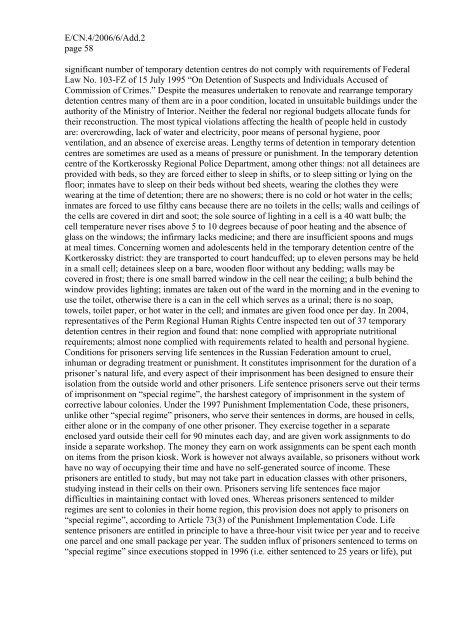E Economic and Social Council - acnudh
E Economic and Social Council - acnudh
E Economic and Social Council - acnudh
Create successful ePaper yourself
Turn your PDF publications into a flip-book with our unique Google optimized e-Paper software.
E/CN.4/2006/6/Add.2<br />
page 58<br />
significant number of temporary detention centres do not comply with requirements of Federal<br />
Law No. 103-FZ of 15 July 1995 “On Detention of Suspects <strong>and</strong> Individuals Accused of<br />
Commission of Crimes.” Despite the measures undertaken to renovate <strong>and</strong> rearrange temporary<br />
detention centres many of them are in a poor condition, located in unsuitable buildings under the<br />
authority of the Ministry of Interior. Neither the federal nor regional budgets allocate funds for<br />
their reconstruction. The most typical violations affecting the health of people held in custody<br />
are: overcrowding, lack of water <strong>and</strong> electricity, poor means of personal hygiene, poor<br />
ventilation, <strong>and</strong> an absence of exercise areas. Lengthy terms of detention in temporary detention<br />
centres are sometimes are used as a means of pressure or punishment. In the temporary detention<br />
centre of the Kortkerossky Regional Police Department, among other things: not all detainees are<br />
provided with beds, so they are forced either to sleep in shifts, or to sleep sitting or lying on the<br />
floor; inmates have to sleep on their beds without bed sheets, wearing the clothes they were<br />
wearing at the time of detention; there are no showers; there is no cold or hot water in the cells;<br />
inmates are forced to use filthy cans because there are no toilets in the cells; walls <strong>and</strong> ceilings of<br />
the cells are covered in dirt <strong>and</strong> soot; the sole source of lighting in a cell is a 40 watt bulb; the<br />
cell temperature never rises above 5 to 10 degrees because of poor heating <strong>and</strong> the absence of<br />
glass on the windows; the infirmary lacks medicine; <strong>and</strong> there are insufficient spoons <strong>and</strong> mugs<br />
at meal times. Concerning women <strong>and</strong> adolescents held in the temporary detention centre of the<br />
Kortkerossky district: they are transported to court h<strong>and</strong>cuffed; up to eleven persons may be held<br />
in a small cell; detainees sleep on a bare, wooden floor without any bedding; walls may be<br />
covered in frost; there is one small barred window in the cell near the ceiling; a bulb behind the<br />
window provides lighting; inmates are taken out of the ward in the morning <strong>and</strong> in the evening to<br />
use the toilet, otherwise there is a can in the cell which serves as a urinal; there is no soap,<br />
towels, toilet paper, or hot water in the cell; <strong>and</strong> inmates are given food once per day. In 2004,<br />
representatives of the Perm Regional Human Rights Centre inspected ten out of 37 temporary<br />
detention centres in their region <strong>and</strong> found that: none complied with appropriate nutritional<br />
requirements; almost none complied with requirements related to health <strong>and</strong> personal hygiene.<br />
Conditions for prisoners serving life sentences in the Russian Federation amount to cruel,<br />
inhuman or degrading treatment or punishment. It constitutes imprisonment for the duration of a<br />
prisoner’s natural life, <strong>and</strong> every aspect of their imprisonment has been designed to ensure their<br />
isolation from the outside world <strong>and</strong> other prisoners. Life sentence prisoners serve out their terms<br />
of imprisonment on “special regime”, the harshest category of imprisonment in the system of<br />
corrective labour colonies. Under the 1997 Punishment Implementation Code, these prisoners,<br />
unlike other “special regime” prisoners, who serve their sentences in dorms, are housed in cells,<br />
either alone or in the company of one other prisoner. They exercise together in a separate<br />
enclosed yard outside their cell for 90 minutes each day, <strong>and</strong> are given work assignments to do<br />
inside a separate workshop. The money they earn on work assignments can be spent each month<br />
on items from the prison kiosk. Work is however not always available, so prisoners without work<br />
have no way of occupying their time <strong>and</strong> have no self-generated source of income. These<br />
prisoners are entitled to study, but may not take part in education classes with other prisoners,<br />
studying instead in their cells on their own. Prisoners serving life sentences face major<br />
difficulties in maintaining contact with loved ones. Whereas prisoners sentenced to milder<br />
regimes are sent to colonies in their home region, this provision does not apply to prisoners on<br />
“special regime”, according to Article 73(3) of the Punishment Implementation Code. Life<br />
sentence prisoners are entitled in principle to have a three-hour visit twice per year <strong>and</strong> to receive<br />
one parcel <strong>and</strong> one small package per year. The sudden influx of prisoners sentenced to terms on<br />
“special regime” since executions stopped in 1996 (i.e. either sentenced to 25 years or life), put
















